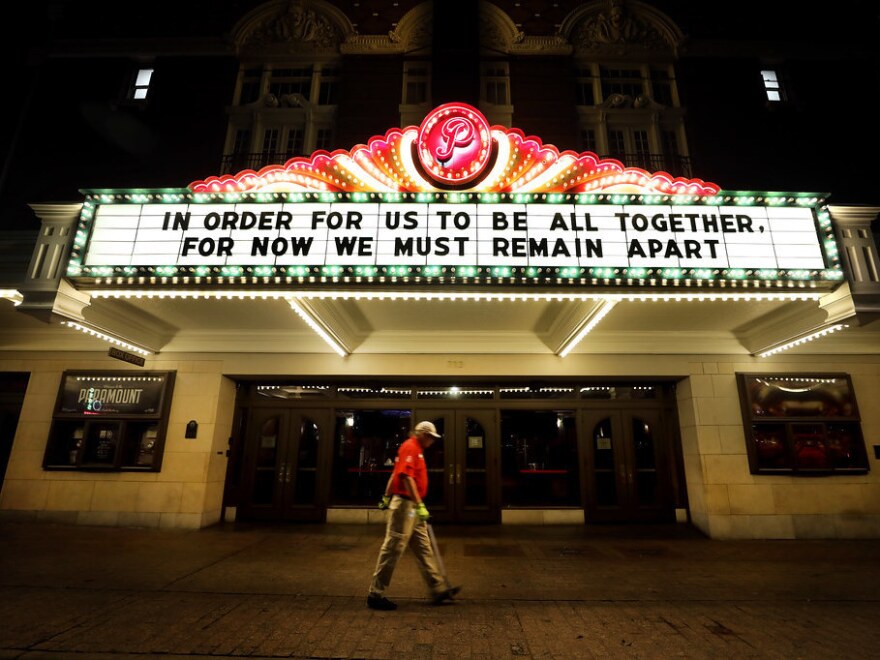For every city, there was a specific moment in 2020 when things became real. Serious. In Austin, it's an easy time to pinpoint. Late afternoon on March 6, after days of statements to the contrary, Mayor Steve Adler canceled South by Southwest. In retrospect, this seemed like a no-brainer. Obvious, even. But at the time, it was controversial, almost unthinkable. Could something this big even be stopped?
South by Southwest has steadily grown to be globally recognized as one of the largest annual gatherings of industry professionals. Yet, in Austin, SXSW looms larger than anything on the city's calendar. Its reach extends into virtually every aspect of the city's lifeblood. The SXSW staff had spent a full year planning the event. Speakers were booked, thousands of flights were scheduled, tours were routed, parties were set, and hundreds of venues, spaces and retail establishments were waiting in anticipation.
They not only expected this economic windfall. They depended on it. It's hard to put yourself in the before times, when there were only ominous signs of COVID-19, when there was still hope it all might be reined in. The SXSW cancellation was chilling, and not only in its actual local impact. A decision of this magnitude could only mean one thing: Everything was about to change.
A week later, with the city still reeling in the aftermath, COVID-19 reached Austin, and everything — schools, businesses and, of course, music venues — began completely shutting down. And we all begin to grapple with the situation. Big shows and tours optimistically rescheduled a month or two later. How long would this last? What did it mean to be the self-proclaimed "Live Music Capital of the World" without any live music? How would artists and venues survive? And who would help us get through this?
It became apparent pretty quickly it would not be the Trump administration; they left decisions on how to deal with COVID-19 up to the individual states. Without federal guidelines, there were wildly uneven results. Feelings of panic and helplessness rose along with COVID-19 infections and deaths.

On May 4, KUTX published this column, "A Deafening Silence," that began with this:
"Everyone has a plan until they get punched in the face."
"Mike Tyson gets credit for this saying, universally adopted over the years. Not that long ago, SXSW was about to happen, spring travel was being planned, oil prices and the stock market were booming, new 2020 tours and album releases were getting underway, the NCAA tournament and baseball's opening day were just around the corner. Things seemed to be going just fine. "
They weren't. The pandemic has exposed the dirt swept under the rug, the cans kicked down the road. Income inequality, inadequate medical coverage, leadership and preparedness deficits, gaps in social safety nets, indifference for our artists. In terrifying terms, we're now seeing the damage. Is this really the best we can hope for?
While some of the facts of that piece have changed — the 400,000 dead worldwide is a total now surpassed in the USA alone — the premise has not. Since the advent of streaming, the economics of the industry had shifted musicians to being much more reliant on live music income, which makes their current situation even more perilous.
Leadership and institutions set up to trumpet the success of the music industry were unprepared to help in a crisis of this magnitude, while the ones already aiding the music community, like the Health Alliance for Austin Musicians, the Sims Foundation and others, did what they could to adapt. But the need was overwhelming. And the initial CARES relief package did little to help struggling venues and artists. (In response, the Save Our Stages act was only just passed by Congress in December's relief package).
At the end of May, George Floyd was killed by a policeman in Minneapolis, sparking worldwide outrage, coinciding with an unexpected summer spike in COVID-19 rates. In the midst of this hot and brutal summer, KUTX and our sister station KUT, began plans to create a new podcast, Pause/Play, all about the shutdown and how musicians were coping with the pandemic. The first episode, which debuted on September 22, titled "The Pause," began back where it all started, with voices across the city relaying the shock that was only beginning to sink in.
9(MDA3MzEzNjc2MDEzMDI2Mzc4OTc4NTFmNg001))
Copyright 2021 KUT 90.5









